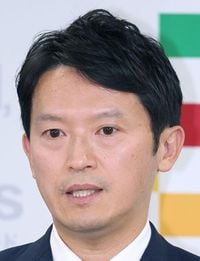A document titled "Interim Summary Report" has brought to light significant allegations surrounding the re-election campaign of Hyogo Governor Motohiko Saito, 47, and the involvement of PR company "merchu" and its CEO, Kashiwagi Orita, 33. This nearly 40,000-character report has prompted the Kobe District Public Prosecutors Office and Hyogo Prefectural Police to launch a forced investigation into the company shortly after acquiring the document.
On February 7, 2025, authorities executed a raid on the offices of merchu and the home of Orita, acting on suspicions of violations of the Public Offices Election Act, specifically regarding bribery. During the search, law enforcement confiscated smartphones and other materials that could be critical to their ongoing investigation.
The controversy began on November 20, 2024, just three days after the gubernatorial election, when Orita published an article on the platform "note." The article featured photographs of Saito and Orita in a meeting at the merchu conference room, implying that the PR firm had a significant role in managing Saito's social media strategy as part of his campaign efforts.
Following the election, it was revealed that Saito's campaign had paid 715,000 yen to merchu. This payment raised eyebrows, leading to allegations that it constituted illegal compensation for election-related activities conducted via the internet, which would violate the Public Offices Election Act. In response, Saito's legal team contended that the funds were allocated for legitimate expenses, such as the design and production of posters and flyers, which are permissible under the election law.
Despite these claims, the investigation has intensified. A spokesperson for the prosecutors indicated that they had accepted a criminal complaint against both Saito and Orita in December 2024. They confirmed that Saito's support group had indeed made the payment to merchu. However, they also noted that the company had not fully cooperated with requests for the voluntary submission of relevant materials, complicating the investigation.
"The prosecution is currently analyzing the communications and transactions to determine whether any legal violations occurred," stated a source familiar with the investigation. This scrutiny comes amidst growing concerns over transparency and ethical conduct in political campaigns, especially regarding the influence of PR firms.
In a related development, Orita defended his actions, claiming that the posts made on social media were exaggerated and that the involvement of his firm in Saito's campaign was voluntary. He stated, "The SNS-related activities were done on a voluntary basis, and any insinuations of wrongdoing are unfounded." This assertion has not quelled the suspicions surrounding the financial transactions and the nature of the relationship between Saito's campaign and merchu.
The implications of this case extend beyond individual accountability, calling into question the broader practices within political campaigning in Japan. As the investigation unfolds, it may set precedents for how PR firms engage with political candidates and the ethical boundaries that govern such relationships.
Political analysts have noted that the outcome of this investigation could have significant repercussions for future elections, particularly in how candidates utilize social media strategies and the financial transparency of their campaigns. The ongoing scrutiny of Saito's re-election may also affect public trust in political institutions, especially if evidence of misconduct is substantiated.
As the Kobe District Public Prosecutors Office and Hyogo Prefectural Police continue their investigation, they are expected to delve deeper into the financial records and communications between Saito's campaign and merchu. The focus will likely be on understanding the extent of the PR firm's involvement and whether it crosses legal boundaries set by the Public Offices Election Act.
This case serves as a reminder of the growing intersection between politics and public relations in Japan, where the influence of social media and digital campaigning is becoming increasingly prominent. It raises critical questions about the integrity of electoral processes and the need for stringent regulations to ensure fair competition among candidates.
In recent years, Japan has seen a surge in the use of social media as a campaign tool, leading to a more dynamic yet complex electoral landscape. As candidates strive to connect with voters online, the potential for ethical dilemmas and legal challenges also rises, making the role of regulatory bodies more vital than ever.
The developments in Saito's case are being closely monitored by political observers and the public alike. With the spotlight on the conduct of both candidates and their affiliated organizations, the ongoing investigation could lead to significant changes in how political campaigns are conducted in Japan.
In conclusion, the allegations surrounding the Hyogo gubernatorial election and the involvement of merchu in Saito's campaign highlight the pressing need for transparency and accountability in political practices. As the investigation progresses, it will be crucial for all parties involved to uphold the integrity of the electoral process and restore public trust in democratic institutions.





